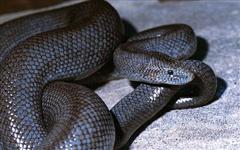Boa - Coastal Rosy
Scientific Name: Lichanura trivirgata roseofusca
Wed, 9th July, 2025 - 10:03 am GMT
Sponsor Ads:

Alternative Name
Scientific Name: Lichanura trivirgata roseofuscaBasic Info
A moderately sized animal, the Coastal Rosy Boa averages between 22.4 and 35.4 inches, or between 57 and 90 centimeters. They are moderately heavy and have flat, glossy scales. Their heads are characterized by the enlarged chin shield and lack of scales on the top of their heads that, on most snakes, resemble plates. Their small eyes have vertical oval pupils. The skin of the Coastal Rosy Boa is blue-gray in color with three broad stripes going down the back. The stripes are usually brown, orange or reddish-brown. On some animals, the stripes are very close in shade to the background color and the animal appears unicolored. The underside of the Coastal Rosy Boa is cream colored with gray spots. Besides the regular Coastal Boa, there are three other varieties of the Coastal Rosy Boa. These are: the Albino Coastal Rosy Boa, which is entirely white and can reach up to four feet in length; the San Gabriel Mountain Rosy Boa, a rare subspecies with excessive orange markings and a maximum length of 42 inches; and the Central Baja Rosy Boa, whose gray stripes are shaded with orange and yellow. Whatever the subspecies, young Coastal Rosy Boas usually have a lighter background color, making the markings more distinct. Male Coastal Rosy Boas can usually be distinguished from females by the presence of well-developed anal spurs on the male.
Health
Because of their moderate size, Coastal Rosy Boas can do well in a 20-gallon-long terrarium. They should be provided with a hiding place. Substrates such as shredded newspaper, aspen shavings, and sand are appropriate for Rosy Boas and allow them to burrow. Because Coastal Rosy Boas generally live in moderately arid areas, they do not require much water and cage humidity levels should be kept low. The enclosure temperature should be about 80 degrees Fahrenheit during the day with a with a basking area about 85 degrees. At night the temperature should be dropped to 70-75 degrees Fahrenheit. Breeding In order to breed, Coastal Rosy Boas must undergo a period of brumation. For about three weeks prior to decreasing the temperature, they should not be fed. Between November and December, the temperature should gradually decrease to between 53 and 56 degrees Fahrenheit. This temperature should be maintained for the next ten or twelve weeks. Although the snakes should be monitored and offered water, they should not be fed. After ten weeks or so, the temperature should be brought back to normal. The Coastal Rosy Boa will usually feed about a week after the temperature is increased. After the brumation period, the snakes will usually mate. Breeding can occur between March and May, and the young will be born between four and six months later. Coastal Rosy Boas give birth to between one and thirteen babies which average between ten and twelve inches long.Habitat
Found in southern California and the Baja PeninsulaBehavior
The Coastal Rosy Boa is native to Mexico and California. They are attractive, non-aggressive animals. They are nocturnal, meaning they are active at night, and are often seen in the evening or early morning on roads. When hunting, they kill their prey by constriction, meaning they wrap their body around the prey until it suffocates. They then swallow the prey head first. When threatened, they usually roll themselves into a ball with their head at the center. They may also exude a foul smelling musk. Coastal Rosy Boas are generally docile, non-aggressive animals.Origin
North AmericaHistory
The Coastal Rosy Boa can be found in southern California and the Baja Peninsula. It is illegal to collect these animals in the wild because they are listed as threatened on CITES II. While once quite common, the Coastal Rosy Boa is becoming quite rare because of destruction of their habitat. Coastal Rosy Boas are easy to care for and breed in captivity, making captive-bred Coastal Rosy Boas readily available.Common Foods
In the wild, the Coastal Rosy Boa will eat almost anything, especially small mammals such as mice.Sponsor Ads:
History is the sum total of things that could have been avoided. -- Unknown
Boa - Coastal Rosy
Coded by: BGID® | ALL RIGHTS RESERVED Copyright © 2000-2025
Disclaimer | Privacy | Report Errors / Contact | Credits









